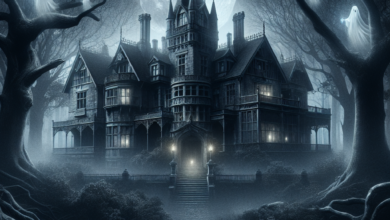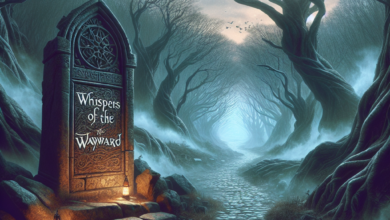As the autumn leaves began to carpet the streets of the quaint Yorkshire village of Aberston, a shroud of mist settled over the town one particularly dreary evening. The air was laden with an unsettling silence, broken only by the distant echo of footsteps and the occasional rustle of wind whispering through the trees. It was the sort of night when shadows stretched longer and secrets hid in the folds of darkness. And on such a night, old tales resurfaced at the local pub, the front of which was painted by the dull glow of flickering gas lamps, casting brief glimpses of filtered warmth onto the cobblestones.
Among the village’s elders, tales of the Wailing Wall were legendary, spoken of only in hushed tones. This was no ordinary boundary; it was said that the stones were imbued with sorrow, a remnant of lost souls bound to this world. The Wailing Wall, an ancient structure on the outskirts of Aberston, had borne witness to centuries of heartbreak, its crumbling stones intertwined with the lore of the village. The wall, made from heavy granite with moss creeping over its surface, had once been a refuge for the grieving, a place where villagers would go to mourn those dearly departed. However, in time, it became something far more sinister.
It was on that particularly bleak evening that a newcomer walked into The Olde Hound. Samuel Thorne, a writer in search of an elusive tale, was drawn to Aberston by the legends of the Wailing Wall. With tousled hair and a rugged appearance that belied a sensitive soul, Samuel wore an attentive expression, eager to absorb the gossip swirling around the pub. The locals initially eyed him with the suspicion reserved for outsiders, yet one elderly woman, Mrs Fletcher, couldn’t resist the allure of sharing her beloved stories.
“Ah, the Wailing Wall,” she began, her voice quavering like the frail fingers that clutched her pint rather tightly. “It’s said that on certain nights, you can still hear the cries of those who once stood there. They say the dead don’t rest easy, and it’s the wall that holds their frozen grief.” The patrons leaned in closer, drawn by the mystery that dripped from her words.
There were tales of those who approached the wall only to be enveloped in a cold dread that clung to the skin like fog. Others claimed that a soft lament could be heard as the night wore on; a sound of longing that resonated in the souls of those who listened. It was said that if one happened upon the wall during a full moon and dared to speak the name of a loved one lost, an otherworldly response might follow—a whisper curling into a wail.
Samuel’s heart thudded as he envisioned the potential of such a haunting narrative. He wasted no time; the chill in the air only stoked the flames of his curiosity. After bidding farewell to his new acquaintances and collecting their stories, he set out into the grainy twilight, the sun sinking into the horizon. The wind bit through his jacket as he made his way to the edge of Aberston, where the Wailing Wall loomed ominously in the distance.
As he approached, the wall appeared to shimmer in the moonlight, shadows playing tricks on his eyes. The air around him felt charged, as if every particle swelled with suspended emotion, like a held breath. Samuel found himself standing before the stones, their surface rough and cool to the touch. The cries of the past echoed faintly in his mind, as if urging him to delve deeper into their sorrow.
“Is anyone there?” he called into the silence, the brave façade he wore trembling behind a façade of bravado. For a moment, there was nothing but the rustle of wind and the crackling of twigs underfoot. Just as he turned to leave, a soft voice—fragile, almost childlike—whispered through the air, “Come back…”
Goosebumps danced up Samuel’s arms as he stepped back toward the wall, heart racing. “Who’s there?” he asked, fighting the tremor in his voice.
“Help… please…” The plea struck a chord deep within him, both chilling and compelling. With a determination that surprised even him, he pressed his palm against the stone, hoping to bridge the gap between the living and the dead.
“Is it you who wails?” Samuel asked, his words scarcely above a whisper. To his astonishment, the wall vibrated ever so slightly beneath his fingers, as if drawing upon energy from the living. The air thickened, and a series of spectral images flickered through his mind—a family in mourning, candles lit in remembrance, eyes veiled by despair. The pulse of history quaked beneath him, tethering sorrow to stone.
“Tell me your story,” he implored, now aware that he stood upon hallowed ground. The atmosphere around him shifted, and he felt a weighty presence encircle him. The wall responded with a cacophony of fragmented voices, intertwining threads of grief that spoke of loss and longing, resonating through time.
He saw her—a woman, cloaked in darkness. Her eyes reflected the moonlight, sorrow spilling into the stillness. “I’m Marigold,” she said, her voice woven with sadness. “I’ve waited for him for so long.”
“Who?” Samuel pressed, caught between fear and fascination. “Who are you waiting for?”
“My love… he was taken from me, and I cannot cross over until I know he is at peace.” The weight of her sadness settled in his bones. “I come here to cry, to reach out and beg for forgiveness.”
The lament filled Samuel, intertwining itself with the very heartbeat of the night. He had discovered something profound—here, in this forsaken place, stood unresolved pain seeking release.
“Is there something I can do?” he asked softly. A small flicker of hope lit within him, compelling him to act.
“The wall remembers,” Marigold urged, her voice becoming a mere breath, “Speak his name… and let him know I still love him.”
“Of course,” Samuel replied, sensing time slipping through his fingers like sands in an hourglass. “What was his name?”
“Edward,” came her wistful reply. “He was a good man… taken too soon in battle.”
The moment Samuel uttered the name into the restless night, a tremor rippled through the stones. In response, the wail intensified, drowning out the world around him. Marigold’s figure shimmered beside him, her ethereal form flickering as if caught between realms. Samuel’s heart raced—he witnessed her anguish spill forth, a tempest of unresolved grief entwined with an unmistakable love.
With words barely breaking the surface, he urged, “Edward, can you hear her? She awaits you.”
In that moment, an echo reverberated through the air, resonating deeply within Samuel. A new voice, distinct yet tender, whispered back, “I am here, my love… I hear you.”
A vortex of emotion swirled about the wall, a melding of sorrow and relief. Marigold’s visage softened, light mingling with shadow as she took a step closer to the wall, seeming to stretch her hand towards the other side. “Oh, Edward, I knew you would find your way to me.”
The wailing intensified yet again, yet this time it echoed throughout the night sky, transforming into a haunting melody. A bolt of warmth streaked through Samuel like lightning, and he realised that perhaps the air had shifted—maybe the spirits no longer wept but danced instead.
As the final echoes of sorrow faded, the wall seemed to exhale, releasing centuries of buried grief. In that cleansing moment, Samuel understood the weight of the legacy of the Wailing Wall.
When the echoes died down and silence reclaimed the night, Samuel stepped back, breathless. The fog began to lift as the moon broke through, illuminating the stones in a gentle glow. He turned away from the wall with an overwhelming sense of warmth and peace.
Samuel returned to the village, ready to share the tale he had witnessed—one of love, loss, and closure. The spirits may have clung to the wall through centuries of torment, but now they had found solace. The whispers of the Wailing Wall had transformed, and the beauty of the story he penned would serve to remind Aberston that even in the depths of despair, profound connections endure.





